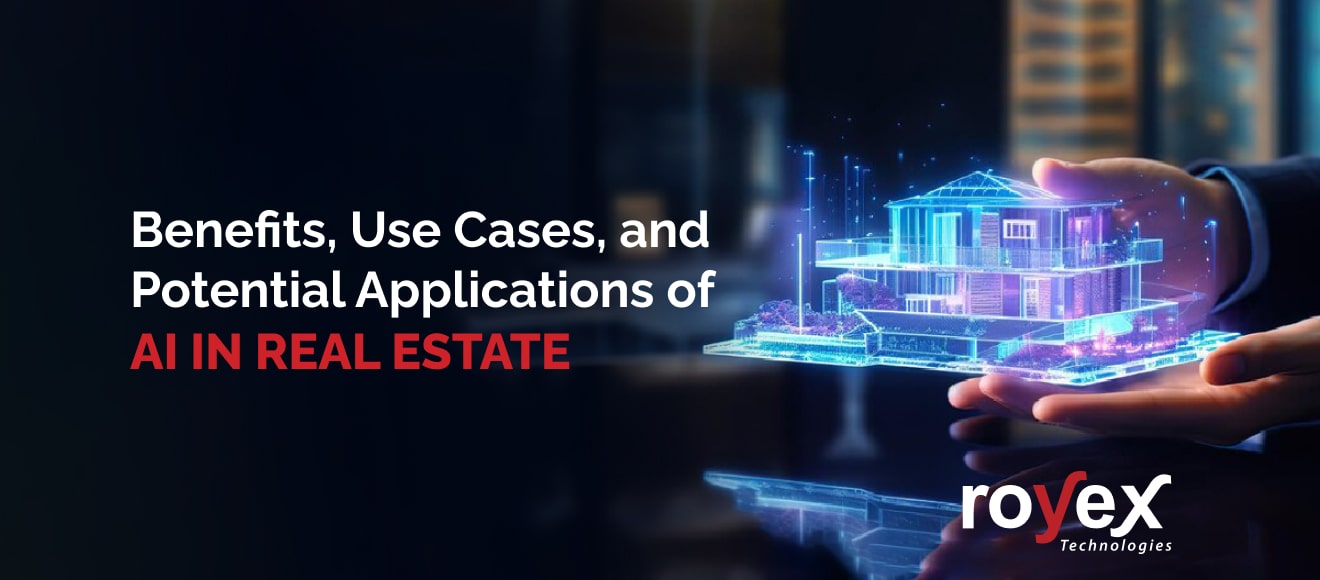
Benefits, Use Cases, and Potential Applications of AI in Real Estate
The real estate industry, traditionally known for its reliance on human intuition and experience, is undergoing a significant transformation with the integration of artificial intelligence (AI). As AI continues to evolve, it is offering new opportunities to enhance efficiency, accuracy, and customer satisfaction within the sector. Artificial intelligence (AI) has been transforming industries across the globe, and real estate is no exception. The adoption of AI is redefining how properties are bought, sold, and managed. With the increasing availability of data and AI-driven technologies, real estate professionals are being equipped with powerful tools that simplify operations and enhance decision-making.
It is projected that by 2030, AI in real estate will contribute to a market value of approximately $15 billion, driven by enhanced data analytics, automation, and predictive technologies.
This article explores the benefits, use cases, and potential applications of AI in real estate, all while highlighting how the industry stands to gain from this technological revolution.
Benefits of AI in Real Estate

Enhanced Decision-Making: Several benefits are being offered by AI in real estate, bringing efficiencies to various aspects of the industry. One of the main advantages is improved decision-making. AI empowers real estate professionals to make better decisions by analyzing vast amounts of data quickly and accurately. Algorithms can process market trends, property values, and customer preferences, providing insights that were previously impossible to obtain in real-time. As a result, more accurate pricing, demand forecasting, and investment decisions are being facilitated.
Improved Efficiency: Automation through AI reduces the time spent on repetitive tasks such as data entry, property management, and customer interactions. AI-driven tools can handle administrative tasks like scheduling, contract management, and document processing, allowing real estate professionals to focus on more complex, value-added activities.
Personalized Customer Experiences: AI enables the creation of highly personalized customer experiences by analyzing individual preferences and behaviors. Virtual assistants and chatbots can interact with potential buyers and tenants, offering tailored property recommendations and answering queries instantly. This not only enhances customer satisfaction but also increases conversion rates.
Predictive Analytics: AI's predictive capabilities help in forecasting market trends, property prices, and rental yields. By analyzing historical data and current market conditions, AI can predict future property values, helping investors and developers make proactive decisions. This minimizes risk and maximizes returns on investment.
Cost Reduction: AI can significantly reduce operational costs in real estate. For example, predictive maintenance powered by AI can identify potential issues in a property before they become costly repairs. Additionally, automated marketing and sales processes reduce the need for a large workforce, cutting down labor costs.
Use Cases of AI in Real Estate
AI is being applied in various ways to optimize real estate processes. The following use cases demonstrate how the technology is being utilized:
Property Valuation: AI-driven models are being used to determine property values with greater accuracy than traditional appraisal methods. These models analyze a wide range of factors, including location, property size, historical sales data, and even neighborhood trends, to provide a precise valuation that adjusts in real-time as new data becomes available.
Virtual Tours and Augmented Reality: AI-powered virtual tours and augmented reality (AR) tools allow potential buyers and tenants to explore properties remotely. These tools use AI to create immersive, interactive experiences that help users visualize spaces, understand property layouts, and even make customization decisions, all without needing to visit the property in person.
Smart Property Management: AI is revolutionizing property management through smart systems that automate tasks such as rent collection, tenant communication, and maintenance scheduling. These systems use AI to monitor property conditions, predict maintenance needs, and optimize energy usage, leading to lower costs and happier tenants.
Automated Marketing: AI is transforming real estate marketing by analyzing customer data to create targeted campaigns. AI algorithms can identify potential buyers or tenants based on online behavior, preferences, and demographics. Automated marketing tools then deliver personalized content, advertisements, and property listings to these audiences, increasing the chances of a successful transaction.
Investment Analysis: Investors are leveraging AI to analyze potential investment opportunities. AI models can process vast amounts of data, including economic indicators, property performance metrics, and market trends, to identify lucrative investment opportunities. This reduces the time required for due diligence and increases the accuracy of investment decisions.
Potential Applications of AI in Real Estate

The future of AI in real estate holds even more promising applications, many of which are still being explored or developed. The following areas are showing significant potential:
AI-Powered Negotiation: In the future, AI could assist in the negotiation process by analyzing offers, counteroffers, and market conditions to recommend optimal negotiation strategies. This could lead to faster transactions and better outcomes for both buyers and sellers.
Hyper-Personalized Property Matching: AI's ability to analyze vast amounts of personal data could lead to hyper-personalized property matching. By considering factors such as lifestyle preferences, commute times, and even social media activity, AI could match individuals with properties that perfectly fit their needs, creating a seamless and satisfying home-buying experience.
Autonomous Property Transactions: AI could enable fully autonomous property transactions in the future. Blockchain technology combined with AI could facilitate secure, transparent, and automated transactions, from listing a property to signing contracts and transferring ownership. This would drastically reduce the time and complexity involved in real estate transactions.
Advanced Urban Planning: AI could play a crucial role in urban planning by analyzing data on population growth, traffic patterns, environmental factors, and economic trends. This would allow city planners to design more efficient, sustainable, and livable urban environments. AI could also predict the impact of new developments on surrounding areas, helping to minimize negative effects and enhance community benefits.
AI-Driven Construction: The construction phase of real estate could also see significant advancements through AI. AI could optimize building designs for energy efficiency, cost-effectiveness, and sustainability. Additionally, AI-powered robots could be used to automate construction tasks, reducing the time and cost associated with building new properties.
Conclusion
AI is rapidly transforming the real estate industry by offering numerous benefits, including enhanced decision-making, improved efficiency, personalized customer experiences, predictive analytics, and cost reduction. Current use cases, such as property valuation, virtual tours, smart property management, automated marketing, and investment analysis, demonstrate AI's potential to revolutionize the industry.
Looking forward, AI's applications in real estate are vast and promising. From AI-powered negotiation and hyper-personalized property matching to autonomous transactions, advanced urban planning, and AI-driven construction, the future of real estate is poised to be more efficient, intelligent, and customer-centric. Embracing AI in real estate not only provides a competitive edge but also sets the stage for a more innovative and sustainable industry.
AI offers a plethora of options suitable for various company sizes and financial capacities. Should you require internal expertise to navigate suitable tools for your business, consulting a leading artificial intelligence (AI) company in Dubai, like Royex Technologies, can prove invaluable.
Check our portfolio to see our previous works. Contact us via email at info@royex.net or call us at +971566027916. To get started with us.





